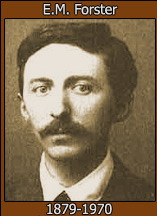
Edward Morgan Forster

Edward Morgan Forster was born on 1 January 1879 in London, England to Alice Clara née Whichelo (1855-1945) and architect Edward Morgan Llewellyn Forster (1847-1880) who died soon after his son was born. Living at Rooksnest (which would later prove the model for Howards End near Stevenage in Hertfordshire) young Edward was raised by his mother, aunts, and governesses. A precocious young man, he started writing stories at the age of six. He attended the Tonbridge School in Kent County, then went on to study history, philosophy, and literature at King's College, Cambridge. He received his Bachelor of Arts in 1900. Although his public school years were unhappy, at King's he blossomed under tutors and the atmosphere of intellectual freedom. He joined groups like the Cambridge Conversazione Society, also known as the Cambridge Apostles, and met lifelong friends including Goldsworthy Lowes Dickinson (1862-1932). Many of them went on to form the Bloomsbury Group.
After coming into an inheritance from his Great Aunt Marianne Thornton (1797-1887), Forster was off on his first of many trips to Europe with his mother. They visited Italy, then Greece, where Forster first experienced the Mediterranean culture he would grow to love and write about. When he was not travelling he lived with his mother at Abinger Hammer in Surrey until her death in 1944. Forster knew early on he would be a writer and was fortunate enough to not experience financial hardships. His first of many sketches, essays, and stories was printed in the Independent Review in 1904. Later, he contributed greatly to the London literary journal The Athenaeum. His first novel Where Angels Fear to Tread (1905), set in Tuscany, was followed by his Bildungsroman novel The Longest Journey (1907), Rickie Elliot being one of his most autobiographical characters. A Room With a View (1908) was Forsters next work, a romance set in Italy, contrasted with Edwardian England's society and mores. While he started writing Maurice in 1912, it was not officially published until after his death in 1971.
During World War I Forster was in Alexandria, Egypt serving with the Red Cross. He also penned short stories that were printed in local newspapers under his pseudonym 'Pharos'. Works inspired by this period of his life include Alexandria: A History and Guide (1922) and Pharos and Pharillon: A Novelist's Sketchbook of Alexandria Through the Ages (1923). Forster also spent much time in India and became well-acquainted with the conflict between the British Raj and the Indian Independence Movement of which he wrote about in A Passage to India (1924), his last novel to reach international acclaim. In recognition he won the James Tait Black Memorial Prize and the Prix Femina Vie Heureuse.
Forster was deeply committed to numerous literary causes during his lifetime including PEN, the international association of writers. As an Honorary Fellow at Cambridge, he lectured there and was a well-known and respected figure on campus. After the death of his mother he maintained residences at Cambridge and in London. In the 1950's he worked with Eric Crozier to write the libretto to Benjamin Britten's opera Billy Budd, based on Herman Melville's 1924 novel of the same name. In 1953 he was awarded the Order of Companions of Honor and in 1969 given Queen Elizabeth's Order of Merit. At the age of ninety, on 7 June 1970, Edward Morgan Forster died at the home in Coventry of friend and long-time companion Robert Buckingham.